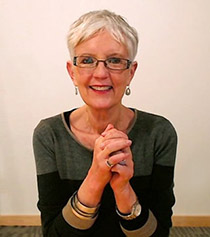Strategies to Treat Patients Trapped in the Freeze Response
 |
with Bessel van der Kolk, MD;
|
 |
with Bessel van der Kolk, MD; Stephen Porges, PhD; Ruth Lanius, MD, PhD; Pat Ogden, PhD; Thema Bryant-Davis, PhD; Bethany Brand, PhD; Deb Dana, LCSW; Janina Fisher, PhD; Kathy Steele, MN, CS; Ruth Buczynski, PhD
Sign up for a Gold Membership

This is a learning community for practitioners. We can’t wait to hear what you’re going to use with your clients
But please do NOT:
- seek advice for personal problems
- ask for referrals
- post links or advertise a product
- post about technical problems
It is interested subject when we just start with the knowledelge that body hold our experience of event in our life. Helping client with trauma using the knowledge of how the brain and the neuro system work. I believe in this treatment as I also use ReAttach therapy which using external arousal regulation to have multiple sensory processing, conceptualization and cognitive bias modification. Thank you for sharing and look forward for the following theme.
This was a fantastic session, I use these techniques and strategies with my clients and its a phenomenal way of working. I have read all the books and watched hours of u-tubes of these top authors. I was so excited at the lineup! This is just what the world needs, a live broadcast – making this such a real relevant and continuous learning journey. This is the ripple effect ….All the tips and tools are relevant for me the oxygen biofeedback was particularly interesting!
Thank you
Thank you for these wonderful, researched and compassionate ways to help patients who are traumatized (also will help me with friends and family members when I go with them to their doctor regarding very serious issues)
I am the mother of a homeless man who has been severely traumatized by his situation over the years. He has a mental illness and will not identify as needing help, medication or therapy, or even a place to live, as so many homeless. I am looking for a residential treatment center focused on your work, because it makes so much sense to me, though I am not a therapist. Just in case he is ever ready. I have been a board member of NAMI since 2005. I am appalled at the lack of interest and support for people to leave homelessness. I think you have the answer if the mental health arena would deploy it. Thank you for your work.
Jacqueline, this is an increasingly prevalent issue that you are dealing with. It would behoove the NICABM community to address this with great fervor. All we can do is all we can do to shine the proverbial spotlight on the issue. Also, while this may or may or may not be your particular issue, I feel there is a need for an entirely new and different approach to the mentally I’ll who truly need to be separated from society because we distress them too.mcuh – not the old model of abusive institutions, but new cities where they have agency and legitimate responsibilities that they are able to do and not threatened by externally imposed losses. It could be a brave new world concept.
Delicious stuff – really valued oximeter as a solid and tactile way for clients to move forward and feel more in active control
Look forward to next session…
This is so helpful. I am a mindfulness and meditation teacher, and what you have shared today supports the core practices that we teach our students. Everyone has suffered to some degree, and even for people with lesser issues, learning why we keep doing things that don’t make sense and that we’d rather not is very valuable insight.
Helpful toolkit of resources. Really got how important it is not to rush. As a mental health midwife, sometimes there is only a brief window working with women and understanding how to recognise and how to help women out of a freeze state, especially where trauma memories are triggered by the perinatal experience Thanks
Srishti
Thank you. Will use micro movements, breathing, eye movements. Also whaat triggered the freeze mode.
Very good first talk…offering a great deal of food for thought.
Thank you.
Thank you so much for tonight’s session – it really made me think about some of the helpful things I’ve done with clients without knowing why as well as the things which were perhaps not so helpful.
Reinforced knowledge about what freeze looks like. Lots of practical applications to add to toolbox re step by step gradual shifting from freeze, also skills reaching for cts. I liked the pauses to allow us to consider whom we might apply ideas to
Very powerful .Thank you.
thank you very much for the concise and valuable content! It’s really helpful to have it all together in such a compact format. See you next week, and greetings from Vienna.
So wonderful! thank you for this.
I will be embracing the idea of planning for what to do when a client enters freeze and how we may move together out of it. Pre-planning will also be useful for me as an individual, as well as my relationship with my spouse, incredible insight!
That was a nice overview/review & update. It affirmed the work I have Ben doing over the last couple of decades & also refreshed & clarified some things. Thanks.
Today’s session expanded my awareness for how the freeze response shows up and how to gently interrupt the pattern.
YOUR FIRST LECTURE IS SO VALUABLE TO ME AND MY WORK. THANK YOU SO MUCH. i INTEND TO SIGN UP FOR GOLD. THANKYOU THANKYOU
Thank you for this series! As ever, so practical and insightful. I have ordered a pulse oximeter to use with one of my clients who is working to overcome her overly strong and sensitive fear response. I have a feeling this will really help her. I’m already using somatic awareness with her, but listening to your courses on Trauma is really helping me deepen my confidence and become consciously competent around what I’m doing with her in trauma informed coaching.
Finally, moving forward out of the sit-n-spin mentality! Thank you Ruthie B. for hostessing this communion of the minds.
Stimulating insightful session…very generous-hearted contributors. X
Brilliant!
This was truly amazing ? thank you. Looking forward to next week. Blessings and love always ????
Pat’s comment was excellent about using the Freeze based response in a positive way – as a resilient option. A strength based approach is the best way to lead someone forward. Thanks
Thank you for a great integration of these trauma experts. It is wonderful that keypoints are summarised during the session – Thank you Ruth. Greetings from Denmark
Understanding biofeedback using an oximeter and deep pressure was something new to me. The session helped me understand how to use micromovements to move out from the freeze state and I would consider using them. Thank you very much for this insightful session!
If you are interested in providing a weighted remedy, invest in a silk filled comforter for clients to drape over themselves during session. The experience is indescribably delicious; they’ll want to buy their own.
I have found this morning’s session very meaningful, personally and professionally. My area of work and volunteerism is
spiritual guidance with all walks of life, including refugees, homeless persons and hospice patients.This was so helpful, clear and well presented by the variety of therapists. Thanks so much.
N.G.
This module was very practical and helpful. It’s really complementary to the books I studied of the trauma-experts talking. I will watch this video many more times and use it in my job as a personal leadership coach and trainer. Thank you!
Dominique, The Netherlands
This session really helped me to clarify for myself the importance of respecting the client’s present state, working with it where they are at, recognising when verbal content has little value, the importance of my own nervous regulation and awareness of my somatic state so that I can communicate calm, stability and safety to the client. The specific strategies relating to eye movement, breathing, micro-movements, focussing on items in environment rather than our relationship (which could be too threatening in this state) were all very helpful. I loved the emphasis on recognising the value of the client’s freeze response as a natural protective defence which served them at the time but which they are now ready to move beyond.
Their freeze response may not have served them at the time. It may have been all they could do in that situation. Children, typically can’t fight back or run away from situations, particularly when they are with family/caretakers. My typical phrases are: “Imagine what you need (or needed) to do” or “Imagine what your body feels like doing now” and I liked the addition of “no matter how crazy it seems”. For 25 years I’ve seen these methods release the trapped energy from bodies and provide the capability to respond with a Flight or Fight response when needed in the Present and Future, after actual/potential circumstances have also been imagined.
Thanks to you all for getting these methods out to our world, where they are so needed, particularly now. And thanks for emphasizing that everyone who intervenes, needs to know how to respond effectively.
Very insightful theoretically, apparently from deep thinking and industrious research; and very practical in technical guide as to how to do. Many Thanks to you all.
This was so helpful, giving kind, practical tips to help someone in freeze response. I’ll definitely be using in in my immediate family/neighbour environment where the stress of lockdown is giving opportunity for many triggers to arise. Many many thanks.
I volunteer to teach financial literacy–budgeting with survivors of Human Trafficking in their later time of ‘retraining’ back to daily life. I work as a volunteer with Selah Freedom in Manatee County/Bradenton FL. As a retired minister and past financial advisor. I know with prior NICABM training what is involved for them in trauma recovery, every detail to be learned helps me understand how to relate to them more confidently and effectively. So thanks for this free broadcast slot.
Thank you for sharing this program with Us! very helpful key information today! one comment about the fillable guide 1 : I completed it and I saved it to my NICABM folder, but the content was lost! any ideas on how to keep the content written on the guide?
Hi Yolanda,
We are glad you enjoyed the session.
I’m so sorry you lost the notes on your study guide. What device and browser are you using?
We recommend using Chrome. On Chrome, once you edit the guide (as a PDF on your Chrome browser), you can select “Print” and then set the “Destination” as “Save as PDF”. This will allow you to save the document you’ve edited with notes.
I hope this helps! Let us know if you have any further questions or difficulties.
Excellent and very helpful for my practice and for my clients!
The program did not come through for some time at 11AM, so I will try to finish it tonight during the 8PM broadcast, after a full day of Telehealth with clients.
Kay Frances Schepp, kschepp@uvm.edu
Really enjoyed the session
Marjorie Blake
Ireland
Having participated in 3 of your major courses, Master Trauma Series, Pain of Abandonment and How to work with a client’s Emotional Triggers I was not surprised to discover with this advanced course that the material would be new and more in-depth. Thank you kindly NICABM I think you have done it again! Excellent content and delivery! —Rhonda
I am here to better understand how to recover from ACE. Today’s program was excellent. Complex ideas were made readily understood and the strategies suggested are user friendly.
Thank you.
Good morning,
I am a psychotherapist who lives in the province of Québec. Is it possible to watch this first part again tomorrow?
Thank you
Gisèle Doyon
Hi Gisèle,
Yes, it is possible. We are broadcasting today (10/14) at 5pm and 8pm Eastern Time, and tomorrow (10/15) at 11am and 2pm.
Hope you enjoy!
This knowledge of dealing with trauma and freeze response really needs to be available to good mothers… not that we don’t already have it within us to do the right things but so as to not allow ourselves to be persuaded or convinced to NOT do what we know is the best way to care for out little ones.
Despite the technical issues at the beginning ( i was not able to get an access to the video), I immediately received an email with a new link to the webinar. The content of the webinar was very informative and easy to put into a practical perspective as speakers gave lots of lived experiences how they used their techniques in their practice.
So look forward to upcoming series!
Alot to learn in just one session. Thankyou very much!
i will use what i learned today in my approach with my clients.
I found the suggestions for how to help clients come out of their freeze response very helpful. Also liked the focus of the impact of trauma shifting from a ‘problem’ to an opportunity.
Thanks! Thanks! Thanks! ?
Thank you so much for these wonderful trainings
Thank you ?
Fabulous as always! Thank you so much. I will be working with the actions to be completed.
great very informative.
I found this session very helpful and will pay more attention to my clients’ reactions, addressing their overwhelmed nervous system more directly – or rather guide it gently